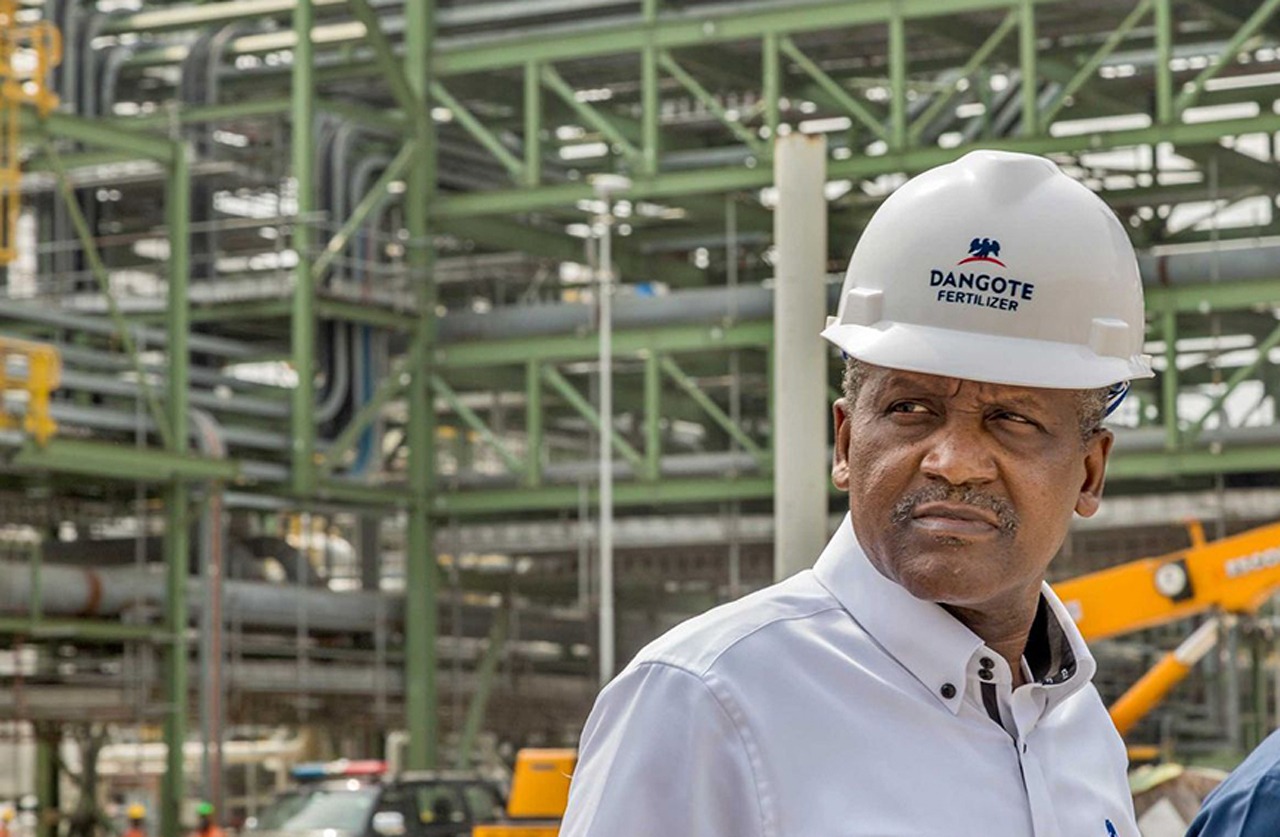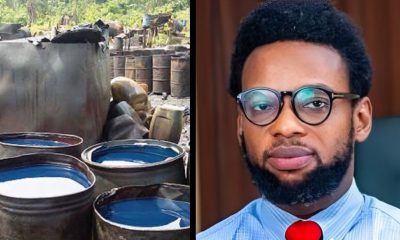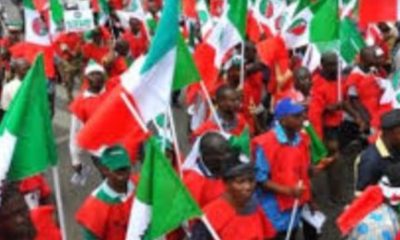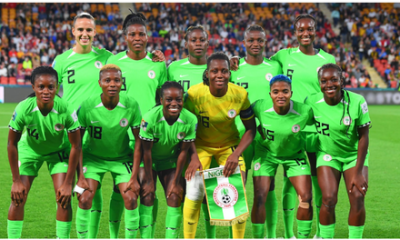National
Our diesel meets international standards – Dangote

Alhaji Aliko Dangote, President of Dangote Group, has asserted that products refined at Dangote Petroleum Refinery and Petrochemicals are of superior quality compared to imported equivalents and meet international standards.
Mr Anthony Chiejina, Chief Corporate Communications Officer, Dangote Group, quoted Dangote in a statement on Sunday in Lagos.
He said Dangote disclosed this during a tour of the Dangote Petroleum Refinery and Dangote Fertiliser Ltd. complex by members of the House of Representatives.
He said the tour included the Speaker of the House of Representatives, Mr Tajudeen Abbas, and other members who observed the testing of Automotive Gas Oil (diesel) from two petrol stations alongside Dangote Petroleum Refinery.
Chiejina said that Dangote expressed his confidence after the House leadership insisted on testing other diesel products, alongside Dangote’s diesel at its state-of-the-art laboratory.
He said that the diesel samples were procured from two well-known filling stations near Eleko junction along the Lekki Epe Expressway, by the members.
According to him, the Chairman of the House Committee on Downstream, Mr Ikeagwunon Ugochinyere, and the Chairman of the House Committee on Midstream, Mr Okojie Odianosen, monitored the collection of samples from the Mild Hydro Cracking (MHC) unit of Dangote refinery for testing of all the samples.
“Lab tests revealed that Dangote’s diesel had a sulphur content of 87.6 ppm (parts per million), whereas the other two samples showed sulphur levels exceeding 1800 ppm and 2000 ppm respectively,” he said.
Dangote emphasised that these findings debunked claims made by Farouk Ahmed, Chief Executive Officer of the Nigerian Midstream and Downstream Petroleum Authority, who recently said that imported diesel surpasses domestically refined products.
Ahmed had alleged that the Dangote refinery and other modular refineries like Waltersmith and Aradel produced diesel with sulphur content ranging from 650 to 1200 ppm—a statement criticised by many Nigerians as a tactic to favour imported products over local ones.
Dangote openly challenged the regulator to compare the quality of refined products from his refinery with those imported, advocating an impartial assessment to determine what best serves the interests of Nigerians.
“We produce the best diesel in Nigeria. It’s disheartening that instead of safeguarding the market, the regulator is undermining it.
“Our doors are open for the regulator to conduct tests on our products anytime; transparency is paramount to us.
“It would be beneficial for the regulator to showcase its laboratory to the world so Nigerians can compare. Our interest is Nigeria first because if Nigeria doesn’t grow, we have limited capacity for growth.
“Right Honourable Speaker and esteemed members, you’ve witnessed the results of the credibility test.
“I appreciate your wise counsel in procuring samples from the filling stations alongside our refinery’s product.
“Ours show a sulphur content of 87.6 ppm, approximately 88, whereas the others exceeded 1,800 ppm.
“Although the NMDPRA permits local refiners to produce diesel with sulphur content up to 650 ppm until January 2025, as approved by ECOWAS, ours is significantly lower.
“We aim to achieve 10 ppm, aligning with the Euro V standard. Imported diesel is capped at 50 ppm, but as you’ve seen, those from the stations, imported by major marketers, fall well outside this standard.”
Dangote pointed out that high-sulphur content diesel regularly imported into the country often comes with dubious certifications.
He emphasised that the most effective method to verify the quality was to purchase the product directly from filling stations and conduct credibility tests.
According to him, this issue has resulted in both health risks and financial losses for Nigerians.
“Dubious certifications often accompany the importation of high-sulphur diesel into Nigeria, causing both health risks and financial losses for Nigerians.
“The best method to verify this is to purchase the product directly from filling stations where end-users obtain it.
“I believe Farouk Ahmed speaks without sufficient knowledge of our refinery. We have successfully exported diesel and jet fuel to Europe and Asia without any complaints; in fact, we have received repeated orders, indicating satisfaction with our products,” Dangote noted.
Supporting Dangote’s assertion, vice president of Gas and Oil at Dangote Industries Ltd., Devakumar Edwin, highlighted recent actions by European countries like Belgium and the Netherlands.
“These countries have expressed concerns about the carcinogenic effects of high-sulphur diesel being dumped into the Nigerian market, prompting them to impose bans on such fuel exports to West Africa.”
Edwin informed the federal lawmakers that the Dangote Petroleum Refinery, designed to process a wide range of crudes including various African and Middle Eastern crudes, as well as US Light Tight Oil, conforms to Euro V specifications.
In addition, he said, it is designed to comply with US EPA, European emission norms, Department of Petroleum Resources (DPR) emission/effluent norms, and African Refiners and Distribution Association (ARDA) standards.
Noting that products from the 20 billion dollar facility were of high quality and meet international standards, Edwin said it had the capacity to meet 100 per cent of Nigeria’s demand for petrol, diesel, kerosene, and aviation Jet, with surpluses available for export.
Expressing concern over the controversy surrounding the quality of imported refined products into Nigeria, Abass stated that the Green Chamber would establish a committee to investigate the matter thoroughly.
He emphasised that sampled products from various sources would undergo testing as part of this initiative.
The Speaker also expressed admiration for the infrastructure at the Dangote Oil Refinery, describing it as a significant asset in Nigeria’s quest for self-sufficiency in petroleum products.
He noted that the refinery had positioned itself as a pivotal player, especially at a time when global concerns over energy security and sustainability are paramount.
“Today’s visit to the magnificent facilities of Dangote Industries Oil Refinery section has been nothing short of enlightening.
“It has afforded us a rare opportunity to witness first-hand the monumental strides that your organisation has made in transforming the landscape of petroleum production in Nigeria.
“The sheer scale and sophistication of this facility are awe-inspiring; it stands as a beacon of hope for our country as we navigate through the turbulent waters of energy supply challenges,” he said.
Commending the state-of-the-art technology implemented at the petroleum refinery, Abbas praised it as revolutionary and a shining example of engineering and innovation excellence.
“Each corner of this facility resonates with the echoes of hard work, dedication, and an unyielding pursuit of quality.
“It is evident that every drop produced here carries not just oil but also the hopes and dreams of millions who yearn for a brighter future.
“We are deeply impressed by what we have seen during this visit which confirms the rating of this industry as the single largest oil refinery in Africa.
“This remarkable achievement does not merely reflect corporate success; it symbolises national pride, a tribute to what can be accompanied when visionary leadership meets relentless determination,” he said.
Acknowledging the numerous challenges likely encountered during the construction of the refinery, the Speaker lauded Dangote for his steadfast commitment to achieving excellence.
“I would like to take this opportunity to acknowledge the myriad challenges that have beset this remarkable facility.
“The regulatory hurdles that often loom like dark clouds over progress, the complexities surrounding crude oil supplies that can stifle even the most ambitious endeavours.
“And the daunting economic landscape we navigate especially in these times when our economy grapples with foreign exchange constraints are all formidable adversaries.
“Yet, despite these tribulations, your unwavering commitment to excellence shines through,” he attested.
You may like
-
Ruud van Nistelrooy Opens Up on Hurtful Manchester United Exit Before Taking Leicester City Job
-
Why I don’t trust any public institution in Nigeria – Fisayo Soyombo
-
Minimum Wage: Cross Rivers Workers to embark on indefinite strike
-
Bayer Leverkusen Forward Victor Boniface Faces Possible Sanction for Reckless Driving Incident
-
International Friendly: Gusau, Sanusi, Falode to cheer Super Falcons against Les Bleues
-
Ancelotti Optimistic Despite Real Madrid’s Struggles in Champions League League
-
Paul Merson Predicts Premier League Results for Weekend Fixtures
-
Naira Appreciates Against Dollar Amid Increased FX Supply
-
8th African Nations Championship: Togolese, Moroccan officials for Nigeria, Ghana matches
-
Super Eagles Drop Eight Places in Latest FIFA Rankings
-
Tinubu Makes Historic State Visit to France as Macron Seeks Closer Economic Ties with Nigeria
-
Simon Ekpa’s Legal Troubles Deepen as Finnish Court Sets Date for Terror Charges
National
ASUU decries number of first-class graduates from private universities

The Academic Staff Union of Universities (ASUU) has frowned at the “increasing numbers of first-class graduates” churned out annually by private universities in the country.
The ASUU National President, Prof. Emmanuel Osodeke, raised the concern on Thursday at an event organised by the body in honour of Prof. Andy Egwunyenga’s successful tenure as Vice Chancellor of Delta State University (DELSU).
The event took place at the DELSU campus, Abraka, Ethiope East Local Government Area of Delta.
Osodeke said that if public universities adopt the same practice without regulation, it could lead to the decline of genuine academic pursuits.
According to him, primary and secondary schools nowadays are producing graduates with excellent grades with insufficient knowledge.
The union leader also decried what he called “the mass exodus” of skilled Nigerian workers to nations perceived to be offering better work and living conditions.
He said that incidents like building collapse in the country indicated there were significant issues within the nation’s institutions.
“The struggle for academics to enjoy a decent standard of living saw some measure of successes in the past when academics could sustain a comfortable life.
“The situation has changed; the unions must return to the frontline for a renewed phase of their struggle.
“ASUU will consistently speak out against injustices and support fairness,” he said.
A member of the union, Prof. Omotoye Olorode, spoke on the topic: “New University Curricula (CCMAS): Context and Matters Arising” .
He said that the CCMAS functioned as an imperialistic mechanism aimed at disrupting the established academic structures in the country’s universities.
Olorode said this was designed to perpetuate a system, where Africans remain agricultural labourers to support the agricultural needs of developed nations.
“UNESCO recommends that 26 per cent of the nation’s budget should be allocated to education.
“Nigeria has never reached more than seven per cent, which reflects our stagnation and reluctance to facilitate growth in the education sector,” he said.
He congratulated the outgoing DELSU vice chancellor on a job well done.
The Chairman of DELSU ASUU, Dr Paul Opone, extended his heartfelt wishes to Egwunyenga.
He said that DELSU had been in dire need of a leader since 2019 to navigate the troubled waters caused by poor leadership.
He praised Egwunyenga for meeting the expectations of ASUU and the university community which, according to him, resulted in widespread celebration across all sectors of the institution.
“This is the first occasion where ASUU had to honour a lecturer at DELSU with such a celebration.
“Prof. Egwunyenga deserves far more than the praises he has received,” he said.
Responding, Egwunyenga expressed joy over the numerous accolades he received from across the three senatorial districts of the state.
He disclosed that his approach as vice chancellor was influenced by the narratives found in Festus Iyayi’s book, “Demons and Monsters”.
National
State police risky, expensive—Cattle breeders

The Kulen Allah Cattle Rearers Association of Nigeria ( KACRAN) has described the proposed state police as too expensive and risky to implement.
Alhaji Khalil Bello, KACRAN National President, said this in a statement in Damaturu on Friday.
He said the cost of establishing state police, depending on a state’s population, was between N10 billion to N30 billion, while monthly salaries and operational costs would gulp about N3 billion.
“These expenditures could divert critical resources from essential public services such as education, healthcare, and infrastructure, which are vital for the development and well-being of the region,” he said.
Bello said there were also concerns over abuse of state police by the politicians.
“There is a risk that these forces could be used to serve the interests of local political leaders rather than the broader public, leading to the victimisation of opposition parties and creating an environment of lawlessness and anarchy.
“Such a scenario could undermine the rule of law and erode public trust in law enforcement,” he said.
He recommended redirecting resources toward initiatives that would promote sustainable development and long-term prosperity for the country.
Bello listed the initiatives as including agriculture investment, youth employment, and industrial and infrastructure development.
The president also proposed the establishment of a security foundation fund in which monthly donation would be made to support the police.
“KACRAN calls on the Arewa Consultative Forum, the Northern Consultative Forum, emirs, and all northern leaders to oppose the establishment of state police.
“We believe that focusing on social services and economic development will yield greater benefits for the region than the creation of state police, which may ultimately exacerbate existing challenges.
“ By investing in sustainable initiatives, Northern states can create a more secure, prosperous, and harmonious society for all citizens,” he said.
National
Gov Okpebholo Suspends Recruitment Into State Civil Service

Edo State Governor, Senator Monday Okpebholo, has approved the suspension of recruitment into the state’s civil service until further notice.
The Governor has also ordered for a comprehensive review of all recruitment exercises carried out by the Godwin Obaseki-led administration between May-November 2024.
In a communication notice signed by the Secretary to State Government (SSG), Musa Umar Ikhilor on Friday, the Governor accused heads of various Ministries, Departments and Agencies (MDAs) of carrying out clandestine recruitment exercises into the State’s civil service.
The notice read: “The Governor of Edo State, His Excellency, Senator Monday Okpebholo is in receipt of report of the clandestine activities being perpetuated by some Commissions, Boards, Parastatals and Agencies of Government in the State.
“Preliminary investigation reveals that these bodies have continued to issue back dated letters of employment to their cronies without due process.
“For the avoidance of doubt, this Administration believes in the principle of fairness and equity which expects that all employment exercise should be merit based, competitive and accessible to all Edo indigenes.
“In light of the foregoing and in order to arrest this ugly trend, the Governor of Edo State, His Excellency, Senator Monday Okpebholo has directed the immediate suspension of all employment processes as well as the review of all appointments carried out since May, 2024 by Commissions, Boards, Parastatals and Agencies of Government.
“Heads of Ministries, Departments and Agencies are to note and comply with the above directive.”
Signed:
Fred Itua,
Chief Press Secretary to Edo State Governor
National
We’ll reintroduce rejected bills on 6-year single term—34 Rep. members

The 34 House of Representatives members who sponsored the bill to amend the 1999 Constitution to provide for a six-year single term for the president have resolved to reintroduce the bill.
Rep. Ikenga Ugochinyere (PDP-Imo) said this in a statement in Abuja on Friday, following the rejection of the bill on Nov. 21 during plenary.
The News Agency of Nigeria (NAN) reports that the bill sought the introduction of a six-year single term for the president, governors and local government chairmen.
NAN also reports that the bill sought zonal rotation of presidential and governorship seats, as well as holding all elections in one day.
Ugochinyere, however, said that all hope was not lost on the bill, as more consultations would be done.
The lawmaker, who is the lead sponsor of the bill, said that the decision on the floor of the house would not put an end to agitation and hope, insisting that the objective behind the bill would be realised.
“The struggle to reform our constitutional democracy to be all-inclusive and provide an avenue for justice, equity and fairness has not been lost.
“The decision on the floor of the house yesterday (Thursday) not to allow the bill for six-year single tenure and all elections to hold in one day will not end the agitation,” he said.
Ugochinyere described the rejection of the bill as a temporary setback that would not affect the campaign for an all-inclusive democratic process.
“We are going to review this decision and find possible ways of reintroducing it after, following due legislative procedures.
“All I can tell Nigerians is that we will continue the advocacy and convince our colleagues to see reason with us.
“If elections are held in one day, it will reduce cost and rigging.
“If power rotates, it will help de-escalate political tensions and six-year single term will go a long way in helping elective leaders to focus on delivering their democratic mandate,” he said.
National
Delta approves N713m for 2024 students bursary payment — Official

Gov. Sheriff Oborevwori of Delta has approved the sum of N713 million for the 2024 bursary award for 32,028 students in tertiary institutions in the country.
The Executive Secretary of the State Bursary and Scholarship Board, Dr. Godfrey Enita, disclosed this in a statement made available to newsmen on Thursday in Asaba.
According to Enita, the governor’s approval for the year 2024, the bursary award will cover students of state origin in public and private universities.
“It also covers students in polytechnics, mono-technics, colleges of education, schools of nursing science, and other tertiary schools, including military and paramilitary institutions.
He described the governor’s gesture as rare and uncommon and should be applauded.
“The governor demonstrates his magnanimity and goodwill towards the well-being of the Delta students and youths in general.
“It also underscores his commitment towards educational advancement through financial assistance to students in diverse forms and through massive infrastructural development in schools across the state.
“It is hoped, as always, that beneficiaries of the state’s financial assistance schemes will continue to be worthy ambassadors of Delta wherever they find themselves,” he said.
National
Survey shows 71% of households affected by food price hike

A new survey report just released by the National Bureau of Statistics (NBS) shows that the most prevalent shock affecting 71 per cent of households in Nigeria is price increases on major food items in the last 12 months.
The survey, 2023/24 General Household Survey-Panel, commonly called (GHS-Panel) Wave-5, is a follow-up to the 2018/2019 GHS Wave-4.
It seeks to enhance the understanding of household living conditions and provide government and other policymakers with reliable information for effective policy decision-making in Nigeria.
It specifically collects information on household income, assets and consumption, income-generating activities, health, education as well as shocks.
The survey conducted in collaboration with the World Bank and released yesterday in Abuja said 48.8 per cent of households surveyed reported that their main mechanism for coping with the increase in the prices of food items was reducing food consumption.
The report further said that 65.8 per cent of the households indicated being unable to eat healthy, nutritious or preferred foods because of lack of money.
The report also shows that 73.0 per cent of survey household members ages 10 to 19 were enrolled in school during 2018/2019 Wave 4 survey. But by 2023/2024 Wave 5 survey, the proportion of the people who were in school had decreased to 44.8 per cent, as 34.8 per cent of those previously enrolled were now out of school.
In the area of energy access, the survey shows that only 40.4 percent of households in rural areas had access to electricity compared to 82.2 per cent of urban households.
It also reports that many households lack toilet facilities and rely on tube wells or boreholes for drinking water. It noted that waste disposal is mostly informal, with 45.6 per cent using bushes or streets.
In his address during the launch of the report, the Statistician General of the Federation (SGF), Prince Adeyemi Adeniran, said the survey is a multi-topic data collection exercise that serves as an essential tool for capturing the dynamics of Nigerian households, providing invaluable insights into their economic activities, well-being, and resilience.
He said it is a longitudinal survey, meaning that it tracks and interviews the same respondents over time. “In the 5th Wave of the survey, approximately the same 5000 households have been followed and interviewed across five waves,” he said.
“This includes Wave One conducted in 2010/11, Wave Two in 2012/13, Wave Three in 2015/16, Wave Four in 2018/19, and now Wave Five conducted in 2023/24.”
He said available records indicate that, over the last five years, the survey findings have been used to design several projects and intervention programmes worth approximately $8.9 billion across many sectors which include Agriculture and Food, Education, Water, Social Protection and Jobs, Governance, and several others.
In his goodwill message, the World Bank’s Country Director for Nigeria, Dr Ndiame Diop, said the survey was important in understanding how Nigerian households responded to policy changes, crises and shocks.
Diop, who was represented by Vinay Vutukuru, Programme Leader, Sustainable Development, Nigeria, however, said the key thing was how the data would be used by ministries and stakeholders for effective policy formulation to achieve economic and sustainable growth.
He pledged the bank’s continuous support in working with the NBS to strengthen Nigeria’s statistical system.

2025: How To Plan A Budget For The Upcoming Year

Ruud van Nistelrooy Opens Up on Hurtful Manchester United Exit Before Taking Leicester City Job

Obasanjo would have died under Abacha if not for me -Gowon

Why I don’t trust any public institution in Nigeria – Fisayo Soyombo

Minimum Wage: Cross Rivers Workers to embark on indefinite strike

Bayer Leverkusen Forward Victor Boniface Faces Possible Sanction for Reckless Driving Incident

Radda approves N70,000 minimum wage for Katsina workers

PH refinery has not commenced bulk sales – NNPC

CBN issues Dec. 1, ultimatum against banks, ATM delays




















